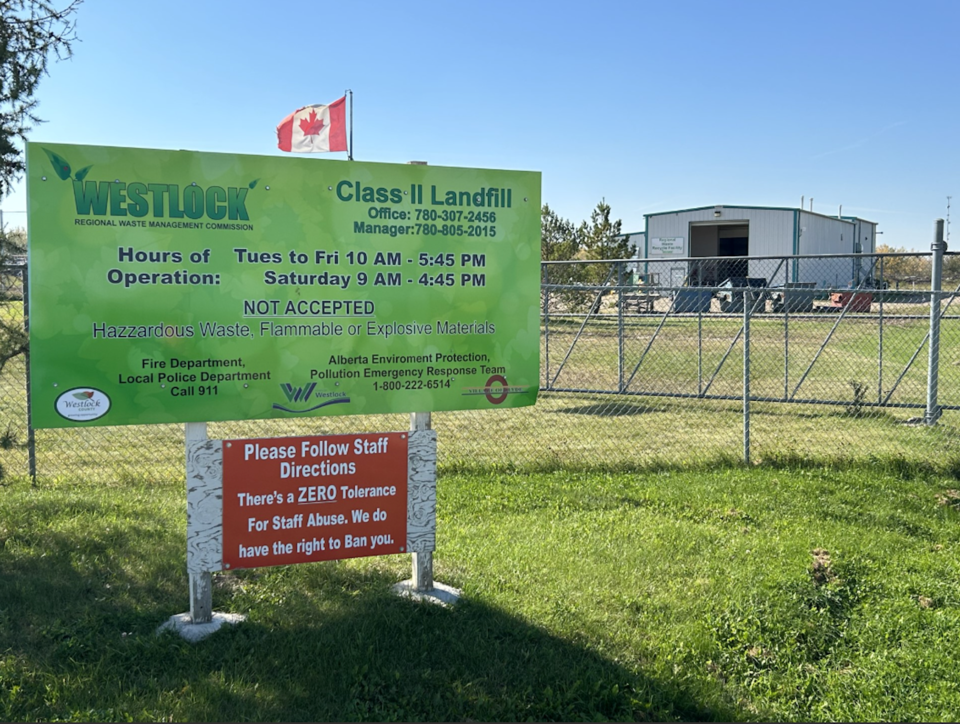WESTLOCK — Starting on Jan. 1, 2024, Westlock County will begin adding a small charge to each tax roll instead of charging ratepayers an annual residential waste permit fee, which one councillor described as a “significant administrative task that has caused … a huge rub between our residents and the staff.”
During their Sept. 12 meeting, Westlock County councillors voted 6-1 to pass a motion to approve several changes to the residential waste permit system that will take effect in the new year, as well as to have administration bring to the Oct. 17 committee of the whole meeting any necessary supporting amendments to the solid waste policy.
Although a recorded vote was requested, administration noted that the motion was already on the table and the request couldn’t be met. However, it was observed that deputy reeve Ray Marquette voted in opposition.
As detailed in the report to council, in response to increased fees from the Regional Waste Management Commission, Westlock County first introduced an annual fee to renew a residential waste permit back in 2021.
The fee allowed the county to recover $90,000 of the $124,285 charged yearly to the county by the commission. However, while the fee was successful in terms of cost recovery efforts, “many residents have expressed concerns that the system is time-consuming and frustrating,” the report noted.
During the Aug. 15 committee of the whole meeting, council received a briefing on the merits of eliminating the annual waste permit fee and replacing it with a smaller charge applied to tax rolls, which would be approximately $11 per tax roll.
One of the main arguments presented at the Aug. 15 meeting was the amount of administrative time it would save, as it takes two staff approximately 150 hours (or one full work month) each year to re-issue all the necessary permits. That works out to a cost of $7,500 per year, which could be better spent on other programs and initiatives.
It should be stressed that the $11 figure is an estimate based on the county having 8,300 tax rolls, and the amount would actually vary based on assessment. As well, this change would also necessitate removing the $90,000 in revenue from the waste services budget.
At the Sept. 12 meeting, Coun. Isaac Skuban asked if the majority of residents would see their costs go down with this change.
Chief administrative officer Tony Kulbisky said he believed that would be the case, adding that it would also keep the system “operating more efficiently and … reduce illegal dumping.”
Coun. Stuart Fox-Robinson acknowledged that people with multiple tax rolls would likely see their costs go up, but he ventured that those people also likely generated more waste to begin with.
He stressed the importance of addressing this major area of contention between county staff and residents.
“People have been abusive (towards county staff) about this. And they shouldn’t be, but they have been," he said. “It was something that was tried. Now we’re looking at changing that decision and making it better for our residents, easier for our residents and frankly better for our staff, who don’t need to be yelled at.”
Coun. Sherri Provencal added they had heard from numerous residents at open houses that it was a hassle to come into the office and get the card needed to use the landfill.
“I just think it's going to be better for our residents and definitely better for our staff,” she said.
Skuban said he understood those arguments, but worried that if some residents saw their costs double or triple, they might see some pushback.
“I wouldn’t be surprised if we have to come back to this,” he added.
He suggested the county may want to consider putting a cap on how much each ratepayer can be charged to prevent some costs from rising exponentially.
Reeve Christine Wiese said a cap could be included in the amendments that administration is bringing back to the Oct. 17 committee of the whole meeting.
Marquette also raised the notion of establishing more transfer sites so that all residents would have roughly the same amount of distance to travel, pointing out that his division didn’t have any transfer stations.
Kulbisky said that this might be a better discussion for a committee of the whole meeting where council could do a more proper “deep dive” on the waste system.



